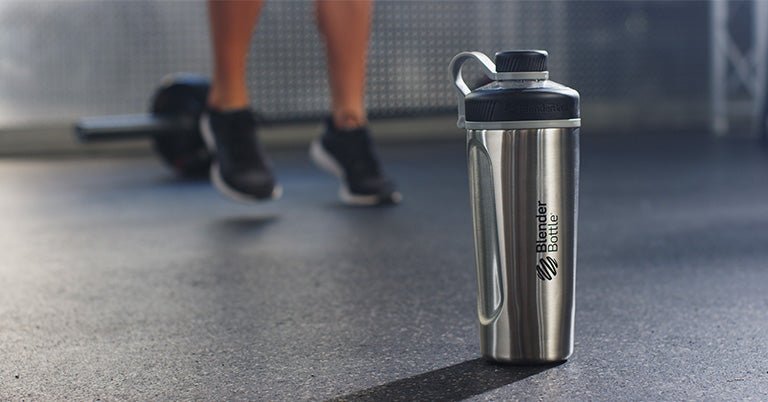You've probably heard of collagen most likely in conjunction with cosmetic procedures. Lately, you may have also heard of athletes and healthy lifestyle enthusiasts taking collagen supplements. And you may be wondering what the deal is with the collagen powder trend.
Think of collagen as the glue that holds you together. Collagen is the most abundant protein in the human body, a critical building block of our physical selves. Our bodies produce it naturally, which may cause you to question the collagen supplement craze especially because collagen powders carry a premium price tag. Are collagen supplements worth the investment? Let's look at what collagen is, what it does, and the potential benefits of collagen supplementation. Then, we'll leave it to you to decide.
What is Collagen
In scientific terms, collagen is a long-chain amino acid composed of glycerin, proline, hydroxyproline, and arginine. It's found all throughout our bodies, in our muscles, skin, blood, bones, cartilage, and ligaments. Collagen holds our bones and muscles together and provides strength and structure to our joints and tendons. It gives our skin strength and elasticity and promotes healing and new tissue growth. It is essential for strong hair and nails and for building muscle. Collagen is extremely strong and flexible. Research shows that some collagen molecules are five to ten times stronger than steel.
What Are Collagen Peptides
Collagen peptides are the type of collagen you'll find in collagen powder and collagen supplements. Peptides are hydrolyzed collagen, meaning the collagen has been broken down using heat, enzymes, and acids to make it very easy to digest.
Collagen Sources
Our bodies produce collagen naturally. As we age, however, our collagen production slows down. This slowing is visibly noticeable in terms of wrinkles and loss of skin elasticity, common signs of aging. Smoking and UV light exposure can also slow the natural production of collagen.
Collagen is present in some foods, such as bone broth and gelatin. One of the reasons drinking bone broth is also a health and fitness trend is because of the collagen it contains. Supplements and powders are another source of collagen specifically, collagen peptides. Because the collagen in supplements is hydrolyzed (whereas the collagen in bone broth and gelatin is not), collagen peptides are the most bio-available form of ingestible collagen.
Collagen used in medical or cosmetic applications is generally sourced from humans, cows, sheep, or pigs. The collagen found in supplements may come from beef, chicken, eggs, or fish. While direct sources of collagen are animal based, it's also possible to enhance collagen with dietary sources rich in nutrients that stimulate its natural production in the body. Vitamin C, for example, is critical to collagen production.
Benefits and Uses of Collagen
Given that collagen is the glue that holds us together, it's easy to understand why it has numerous benefits. In the medical realm, collagen is used in healing wounds and tissue regeneration. It helps attract new skin cells to wounds, thus enhancing the healing process. Studies like this one suggest that collagen may also help in the treatment of osteoarthritis.
Cosmetically, collagen is desirable in terms of improving skin elasticity and hydration and reducing wrinkles and rough skin. While collagen is by no means a fountain of youth, many cosmetic products (lotions and creams) and procedures (injections and fillers) incorporate it in an attempt to plump the skin and retain or restore its elasticity. Most experts agree that the topical application of collage (as with lotions) may be in vain, because collagen molecules are too large to be absorbed directly into the skin. This study shows that oral collagen supplements, however, can help improve the signs of aging.
Athletes supplement with collagen in hopes of supporting muscle development, strengthening connective tissue, and relieving joint pain. Collagen has not yet been studied extensively in relation to athletic applications, but some research does support these goals. In this study, a group of older men saw a greater increase in muscle strength and fat loss when taking collagen supplements in conjunction with strength training, as opposed to the placebo group that did not supplement, yet followed the same training regimen. This study of athletes with sports-related joint pain shows that collagen helped improve their discomfort.
How to Take Collagen Peptides
Most collagen powder dissolves quickly and is hot or cold soluble, making it an easy addition to any smoothie or drink. Unless flavored, collagen is tasteless and odorless, and therefore works well as an addition to any recipe. Keep in mind that collagen alone is not a complete protein, but collagen powder in combination with another protein source could supply all nine essential amino acids.
Because Vitamin C is known to help boost collagen function, adding collagen peptides to orange juice is an effective choice for supplementation. Just add collagen powder and juice to your favorite BlenderBottle shaker, toss in the BlenderBall wire whisk, mix, and enjoy!
What's your experience with collagen powder? Has taking collagen supplements helped you? Share your experience in the comments below.





Leave a comment
All comments are moderated before being published.
This site is protected by reCAPTCHA and the Google Privacy Policy and Terms of Service apply.